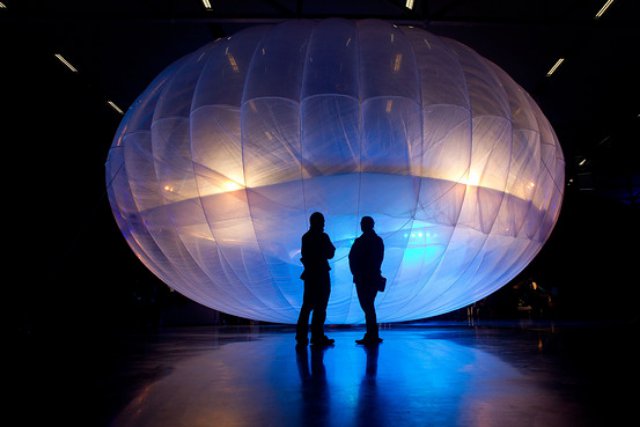As federal regulators consider opening new radio frequencies to wireless services, Google is already eyeing the frequencies to deliver Internet access from the sky via drones and balloons. In a letter to the Federal Communications Commission Friday, Google said new bands could “be useful for offering broadband access via airborne platforms such as high-altitude balloons or unmanned aerial vehicles.”
This suggests Google may be considering using such high-frequency spectrum for Project Loon, its effort to beam Internet signals from balloons circling the earth, and Titan Aerospace, a solar-powered drone maker that Google acquired in April.
A Google spokeswoman declined to comment.
Existing wireless networks, which use licensed spectrum around 1 GHz, are struggling to keep up with surging data flowing to and from smartphones and other mobile gadgets. To relieve the pressure, the FCC recently auctioned licenses around 1.7 and 2.1 GHz; those auctions attracted bids exceeding $30 billion from AT&T Verizon and others.
Higher-frequency spectrum bands, above 24 GHz, have been considered unsuitable for mobile services. But new technologies are challenging that assumption and could dramatically increase wireless broadband speeds, the FCC said in an October press release.
The bands are also likely to be useful nearer the ground, for Internet-connected devices and machines to communicate with each other, or with a central “hub,” Google said in its letter to the FCC. They are well-suited for deploying high-definition video in the home, the company added.
The bands could also support “backhaul,” which plugs a front-end communications networks into the broader, global Internet, Google wrote in the letter.
The company hinted at even more ambitious uses, saying the spectrum may be used for “the next generation of unlicensed broadband services,” including complements to Wi-Fi networks, “or entirely new technologies and innovations.”
Google is testing, buying and investing in multiple ways to expand Internet access because the company benefits when more people get online and conduct searches, stream a YouTube video, send an email on Gmail or text using an Android smartphone.
Google is close to investing $1 billion in Elon Musk’s Space Exploration Technologies to support its nascent efforts to deliver Internet access via satellites, a person familiar with the situation said on Monday.
Photo: Project Loon balloon on display at the Airforce Museum in Christchurch, New Zealand on June 16, 2013 -Agence France-Presse/Getty Images
Source: Wall Street Journal

